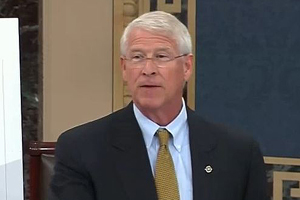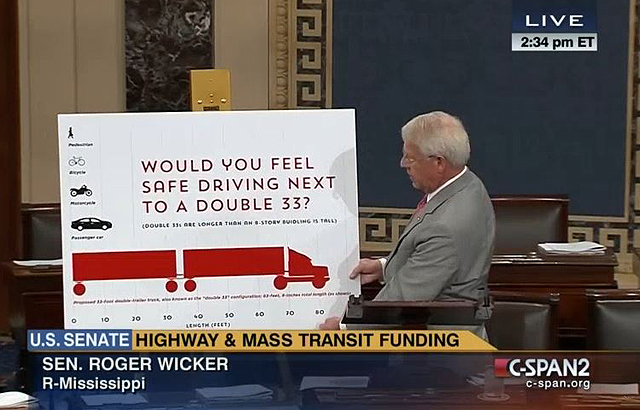Sen. Roger Wicker Pushes Twin 33 Amendment as Republican Leaders Tout Long-Term Bill

 c-span.org
c-span.org
Sen. Roger Wicker (R-Miss.) on July 23 called on Senate colleagues to support his proposal to attach to a six-year highway bill a requirement calling for a comprehensive review of twin 33-foot trailers before they are authorized for use nationwide.
The amendment from Wicker and Sen. Dianne Feinstein (D-Calif.) would leave it up to the secretary of transportation to issue a rule that would increase maximum lengths for pup trailers to 33 feet from 28 feet if the secretary “makes a statistically significant finding” based on a comprehensive truck size and weight study. Also, the secretary must determine that the change in length would not have a negative impact on public safety.
Senate floor leaders have yet to say when a vote on the Wicker-Feinstein amendment would occur. The six-year highway measure currently on the Senate floor would not authorize the increase of such maximum trailer lengths. Meanwhile, Republican leaders have indicated there would be robust debate on high-profile amendments, noting they plan to report the overall measure to the House within a few days.
VIDEO: Wicker speaks on amendment (via c-span.org)
Sen. John Thune (R-S.D.), chairman of the committee with jurisdiction over highway safety policy, told colleagues on the floor of the Senate on July 23 to focus on advancing a long-term bill.
“Most important of all is that we get something that puts in place a multiyear bill that creates the kind of condition that is conducive to jobs, to economic growth,” Thune said.
American Trucking Associations supports a shift toward twin 33s, as does the Coalition for Efficient and Responsible Trucking.
“By allowing 33-foot tandem trailers — which would not change weight limits for commercial vehicles — we can eliminate 6.6 million truck trips a year, which in turn would reduce truck miles traveled by 1.3 billion and cut carbon emissions by 4.4 billion pounds," said Sean McNally, ATA’s vice president of public affairs. "However, most importantly, by reducing truck traffic, based on DOT data, we would eliminate more than 900 crashes."
“Today, 42% of major urban highways are congested, and as a result of growing consumer reliance on Internet shopping, federal highways will see a 40% increase in double trailers over the next decade," the coalition added. "This dramatic increase in truck traffic will make highways less safe for motorists and truckers alike unless steps are taken to make freight transportation more efficient."

